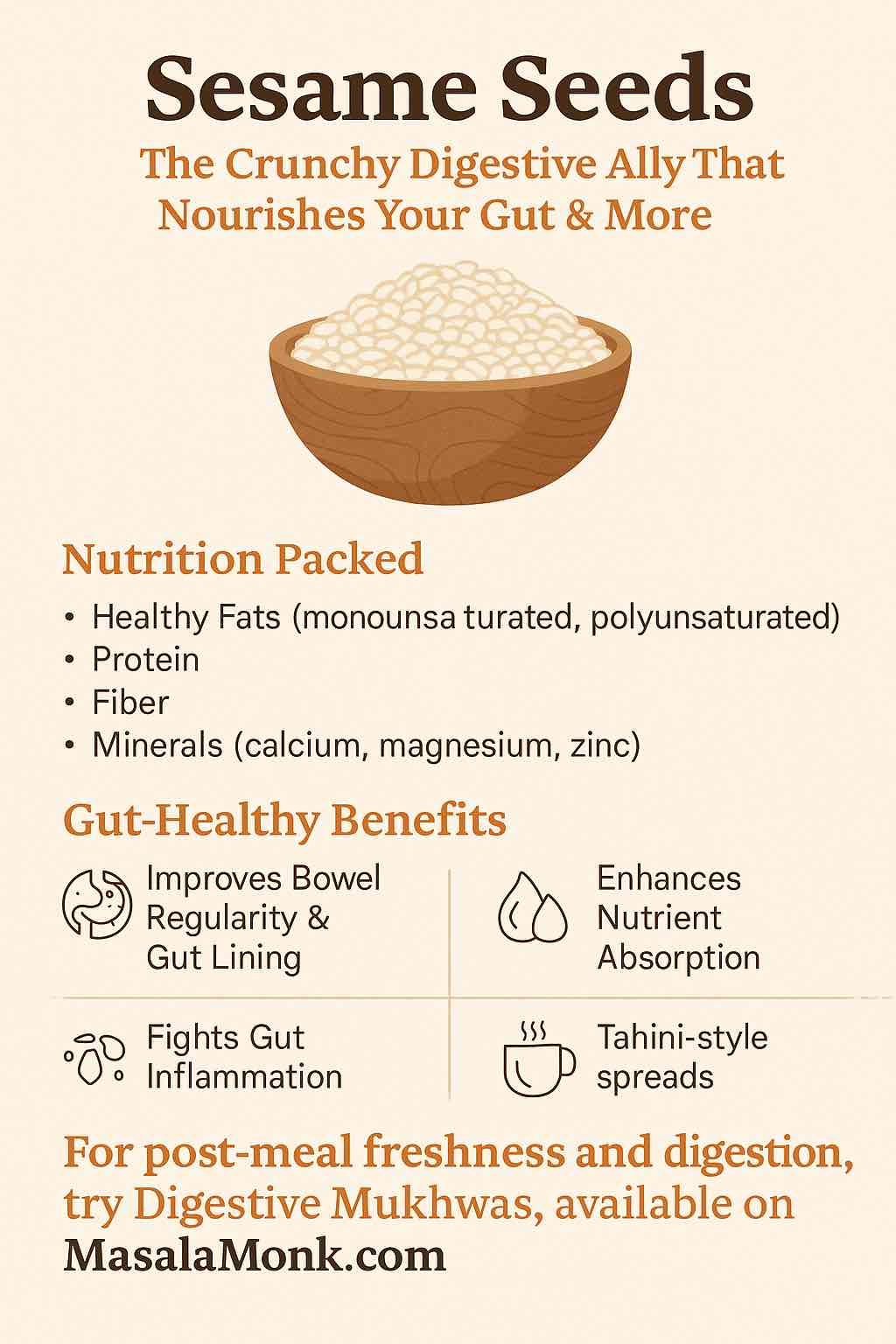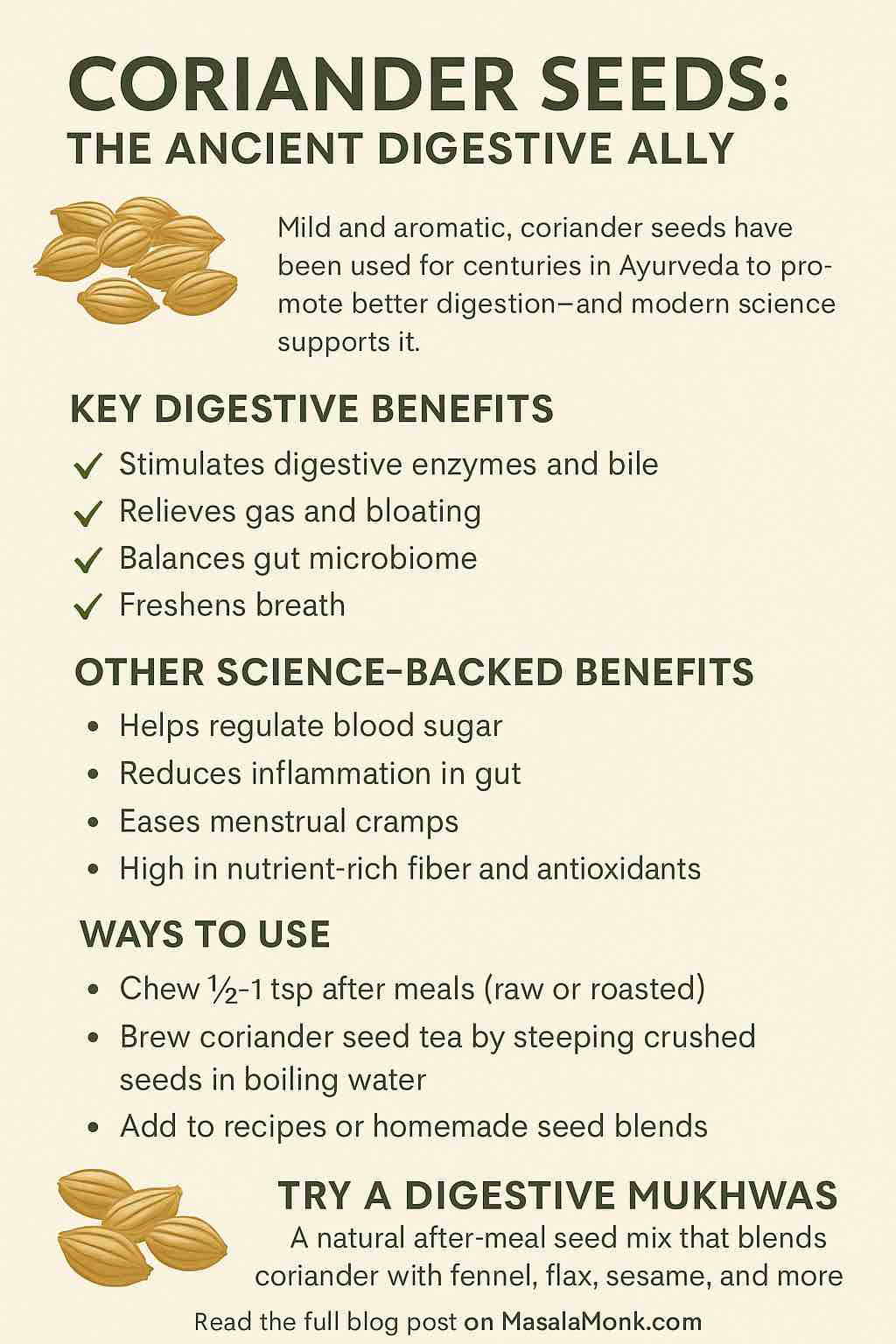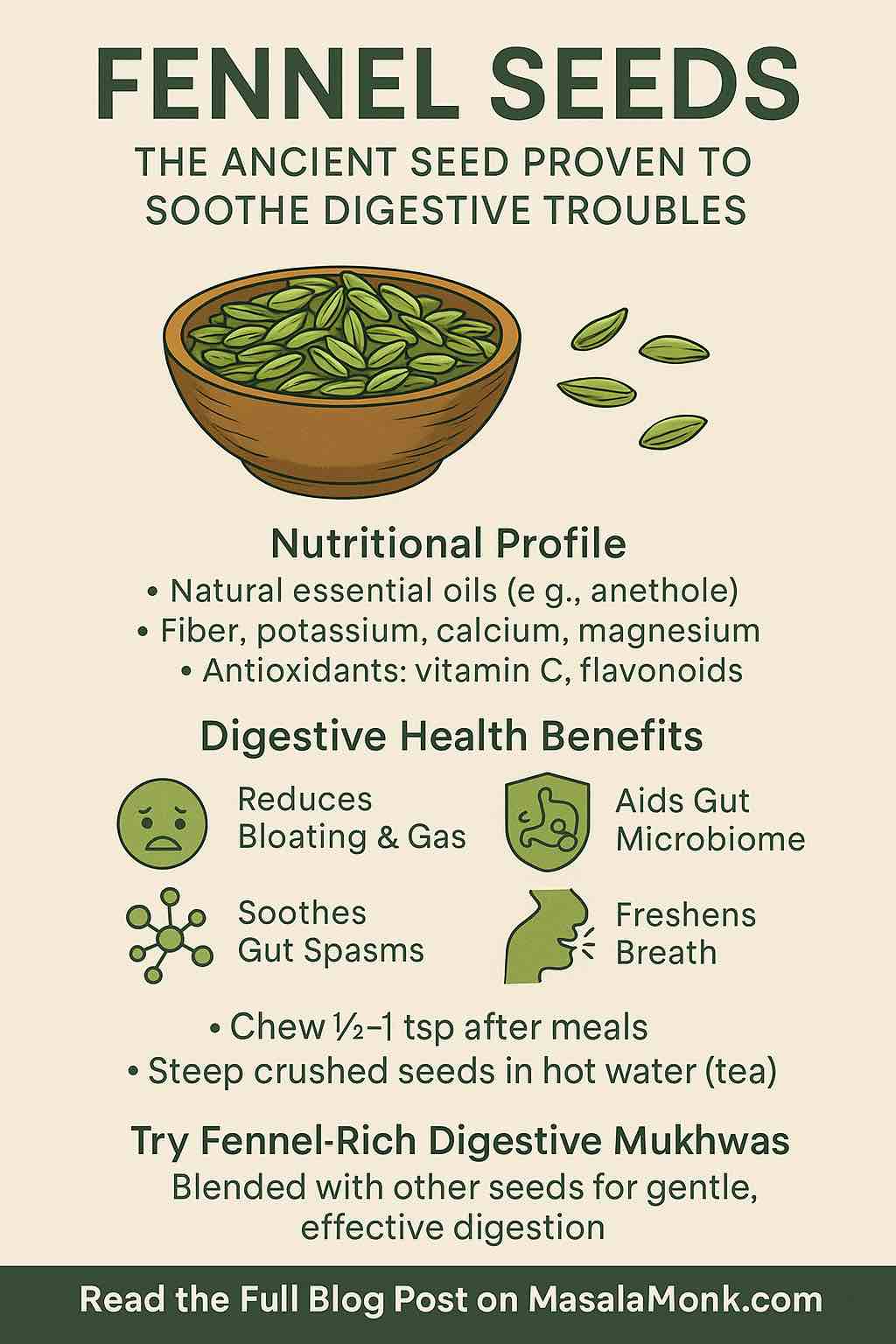
You might sprinkle them on your salad or roll a roll in halwa, but sesame seeds deserve a deeper place in your wellness routine.
Often overshadowed by trendier superfoods, sesame seeds are nutrition-packed gems that benefit not just digestion, but heart health, skin, hormones, and more. When added to a thoughtfully crafted Digestive Mukhwas, they offer both flavor and function—supporting gut comfort, breath freshness, and nutrient absorption.
Let’s uncover the science and wisdom behind these tiny, nutrient-dense seeds—and show you how easy it is to include them in your daily rituals.
🌱 What Are Sesame Seeds?
Sesamum indicum, commonly known as sesame, produces small, flat, oval seeds in shades of white, black, or brown. Often used as a topping or ingredient in cooking, they offer:
- Healthy fats: primarily monounsaturated and polyunsaturated
- Protein (about 5 g per tbsp)
- Dietary fiber
- Minerals: calcium, magnesium, phosphorus, zinc.
- Lignans like sesamin, offering antioxidant and anti-inflammatory actions
These nutrients work together to support a well-rounded, daily wellness habit—not just digestion.
🛡️ Sesame Seeds for Digestive Health
1. Improves Bowel Regularity & Gut Lining
George Mateljan Foundation notes that sesame seeds’ mix of fiber and healthy fats supports smooth bowel movements and intestinal lining health.
2. Fights Gut Inflammation
Sesamin has been shown in animal models to reduce inflammation in colitis and other digestive disorders, helping ease irritation.
3. Enhances Nutrient Absorption
The fats in sesame help dissolve fat-soluble nutrients (vitamins A, D, E, K), improving their uptake.
Toasting seeds also breaks down phytic acid, making minerals more bioavailable.
🧠 Beyond Digestion: Other Research-Backed Benefits
- Heart health: Helps lower LDL cholesterol and reduce blood pressure (American Heart Association studies).
- Bone support: Packed with calcium, magnesium, and phosphorus—critical for bone strength.
- Hormonal balance: Phytosterols in sesame may help modulate estrogen—useful for menopausal support.
- Skin & anti-aging: Antioxidants and nutrients support skin integrity and collagen production.
🥣 How to Use Sesame Seeds Daily
- After meals in mukhwas: Provides crunch and digestive support
- Sprinkle on foods: Add to bread, salads, yogurt, smoothies
- Sesame tea or milk: Blend ground seeds with warm water or milk for a nourishing drink
- Tahini-style spreads: Use in moderation to dress veggies or spreads
🧂 Sesame in Digestive Mukhwas — Why It Works
The Digestive Mukhwas blend, available in a Pack of 2 on MasalaMonk, includes 9% roasted white sesame seeds. In a formula alongside flax, fennel, coriander, mango seed, turmeric, and salt, sesame provides:
- Gut lubrication and smoother digestion
- Trace minerals and essential fats
- Natural aromatic depth—no added sugar, color, or preservatives
Remember: MasalaMonk is a curated marketplace that connects you to small-batch producers who create these blends—they’re not the manufacturer.
👉 Discover the richly textured Digestive Mukhwas here:
🔗 https://masalamonk.com/product/digestive-mukhwas-pack-of-2/
⚠️ Safety & Use Tips
- Enjoy in moderation: Sesame is high in healthy fats—stick to about 1 tsp per serving
- Allergy alert: Sesame allergy is common—avoid if sensitive
- Phytic acid: Toast or lightly soak seeds to enhance nutrient availability
🧭 Final Thought
Sesame seeds bring more than crunch—they offer a balanced blend of digestion, minerals, heart support, and taste. In a well-crafted Digestive Mukhwas blend, they enrich both texture and efficacy—making gut-health rituals easy, nutritious, and delicious.
👉 Ready to add this nourishing bite to your daily routine?
Grab the Digestive Mukhwas on MasalaMonk:
🔗 https://masalamonk.com/product/digestive-mukhwas-pack-of-2/
✅ 10 FAQs – Sesame Seeds for Digestion & Wellness
- How do sesame seeds help with digestion?
Sesame seeds are rich in dietary fiber and healthy fats, which help lubricate the digestive tract, support regular bowel movements, and reduce gut inflammation—especially when roasted and consumed post-meal. - Can sesame seeds help reduce bloating or acidity?
Yes. When paired with gut-soothing ingredients like fennel and coriander, sesame can support smoother digestion and minimize post-meal discomfort like bloating and gas. - What’s the best time to consume sesame seeds for gut benefits?
After meals is ideal, especially when included in a digestive seed mix like mukhwas. You can also include them in salads, rice, or even as tea infusions for general wellness. - Are sesame seeds better raw or roasted for digestion?
Roasted seeds are more easily digested and have enhanced flavor. Light roasting also helps reduce phytic acid, improving mineral absorption. - Can I eat sesame seeds every day?
Yes, in small amounts (about 1 tsp per day), sesame seeds are safe and beneficial for most people. They support digestion, immunity, and skin health. - Do sesame seeds cause any allergies?
Yes, sesame is one of the more common food allergens globally. If you’re allergic or unsure, avoid sesame or consult a healthcare professional before including them. - Are sesame seeds suitable for people with IBS or sensitive digestion?
Yes, in moderate, roasted form. Their fiber and fat support gentle digestion without being too harsh. Always start small and monitor your response. - Is there a convenient way to eat sesame seeds daily without cooking or prepping?
Yes! The Digestive Mukhwas available on MasalaMonk includes sesame seeds in a perfectly roasted and balanced format—just eat a spoonful after meals. - Are sesame seeds safe for children and older adults?
Yes, they’re safe in small amounts when chewed well or ground. Always ensure seeds aren’t swallowed whole by younger kids. - Where can I buy a high-quality sesame-rich digestive blend?
You can purchase the Digestive Mukhwas (Pack of 2)—which contains sesame along with fennel, flax, coriander, and more—on the MasalaMonk marketplace.
👉 https://masalamonk.com/product/digestive-mukhwas-pack-of-2/













